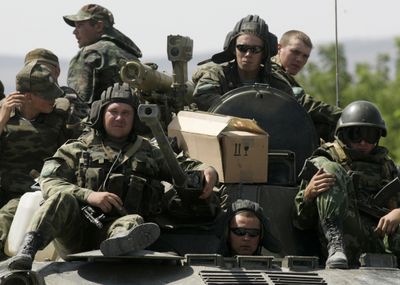Georgia remains under siege
Russian military shows no signs of withdrawing

IGOETI, Georgia – Despite assurances that it would withdraw troops from Georgia starting Monday, the Russian military operated with impunity as its forces moved convoys in and out of the city of Gori and plowed through a police roadblock in this town some 25 miles northwest of Tbilisi, the capital.
In Washington, senior defense officials cited “troubling” intelligence that Russia had set up short-range ballistic missile launchers in South Ossetia. The SS-21 missiles have a range of 40 to 70 miles, meaning they can reach the capital from practically any part of South Ossetia, which Russian forces now occupy.
The U.S. officials also said there was no significant Russian movement out of Georgia.
The deputy head of the Russian military’s general staff, Col. Gen. Anatoly Nogovitsyn, told reporters in Moscow on Monday that Russian troops were being drawn back to the breakaway region of South Ossetia, which sits just on the Georgia-Russia border.
McClatchy journalists working in both the west and center of the country saw little to indicate that was happening. As has been the case throughout the 10-day conflict – which began with a Georgian military move into South Ossetia – Russian commanders seemed intent on showing they controlled the ground.
Russian forces dominated the country’s vital road and rail arteries, held military bases they had seized from the Georgian army, and occupied Gori, a strategically important city and the birthplace of the late Soviet dictator Josef Stalin.
Military convoys continued to move in and out of Gori all afternoon, including tanks and an anti-aircraft gun. The day before, dozens of Russian supply trucks were seen driving from the direction of South Ossetia into the city.
Russian President Dmitry Medvedev again charged Monday that Georgia had provoked the clash 10 days ago by sending forces into South Ossetia, a region in North Georgia. “We shall do our best to not let this crime go unpunished,” state newswires quoted Medvedev as saying.